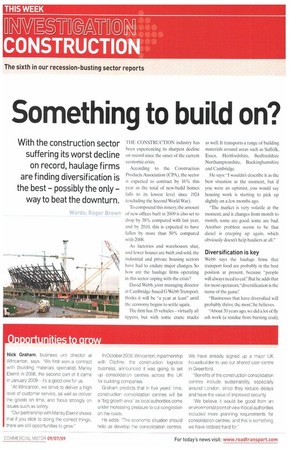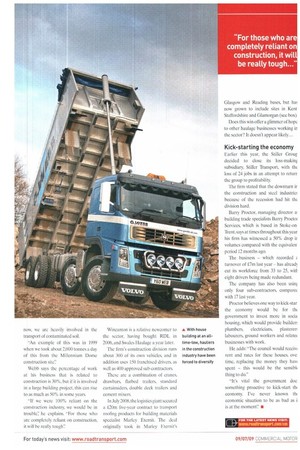Something to buiW on?
Page 22

Page 23

If you've noticed an error in this article please click here to report it so we can fix it.
With the construction sector suffering its worst decline on record, haulage firms are finding diversification is the best possibly the only way to beat the downturn.
Vords: Roger Brown
THE CONSTRUCTION industry has been experiencing its sharpest decline on record since the onset of the current economic crisis.
.kccording to the Construction Products Association (CPA), the sector is expected to contract by 16% this year as the total of new-build homes falls to its lowest level since 1924 (excluding the Second World War).
To compound this misery, the amount of new offices built in 2009 is also set to drop by 38% compared with last year, and by 2010, this is expected to have fallen by more than 50% compared with 2008.
As factories and warehouses shut, and fewer houses are built and sold, the industrial and private housing sectors have had to endure major changes. So how are the haulage firms operating in this sector coping with the crisis?
David Webb, joint managing director at Cambridge-based G Webb Transport, thinks it will be "a year at least" until the economy begins to settle again.
The firm has 35 vehicles virtually all tippers, but with some crane trucks as well. It transports a range of building materials around areas such as Suffolk. Essex, Hertfordshire, Bedfordshire Northamptonshire, Buckinghamshire and Cambridge.
He says:"I wouldn't describe it as the best situation at the moment, but if you were an optimist, you would say housing work is starting to pick up slightly on a few months ago.
"The market is very volatile at the moment, and it changes from month to month, some are good, some are bad. Another problem seems to be that diesel is creeping up again, which obviously doesn't help hauliers at all.
Diversification is key
Webb says the haulage firms that transport food are probably in the best position at present, because "people will always need to eat': But he adds that for most operators. "diversification is the name of the game'?
"Businesses that have diversified will probably thrive the most',' he believes.
"About 20 years ago. we did a lot of fly ash work (a residue from burning coal); now, we are heavily involved in the transport of contaminated soil.
An example of this was in 1999 when we took about 2,000 tonnes a day of this from the Millennium Dome construction site'.'
Webb says the percentage of work at his business that is related to construction is 30%, but if it is involved in a large building project, this can rise to as much as 50% in some years.
'If we were 100% reliant on the construction industry, we would be in trouble': he explains. "For those who are completely reliant on construction, it will be really tough': Wincanton is a relative newcomer to the sector, having bought RDL in 2006, and Swales Haulage a year later.
The firm's construction division runs about 300 of its own vehicles, and in addition uses 150 franchised drivers, as well as 400 approved sub-contractors These are a combination of cranes, drawbars, flatbed trailers, standard curta insiders, double deck trailers and cement mixers.
In July 2008, the logistics giant secured a £20m five-year contract to transport roofing products for building materials specialist Marley Etennt. The deal originally took in Marley Eternit's Glasgow and Reading bases, but has now grown to include sites in Kent Staffordshire and Glamorgan (see box) Does this win offer a glimmer of hop.: to other haulage businesses working is the sector? It doesn't appear likely...
Kick-starting the economy
Earlier this year, the Stiller Grout decided to close its loss-making subsidiary, Stiller Transport, with tilt loss of 24 jobs in an attempt to returr the group to profitability.
The firm stated that the downturn ir the construction and steel industrie2 because of the recession had hit thc division hard.
Barry Proctor, managing director al building trade specialists Barry Proctoi Services, which is based in Stoke-on Trent, says at times throughout this year his firm has witnessed a 50% drop ir volumes compared with the equivalen period 12 months ago.
The business — which recorded 2 turnover of £.7m last year — has alrcad cut its workforce from 33 to 25, witl eight drivers being made redundant.
The company has also been usirq only four sub-contractors, compare( with 17 last year.
Proctor believes one way to kick-star the economy would be for th( government to invest more in socia housing, which would provide builders
plumbers, electricians, plasterer labourers, ground workers and relate( businesses with work.
He adds: "The council would receivi rent and rates for these houses, ove time, replacing the money they havi spent — this would be the sensibli thing to do."
"It's vital the government doe something proactive to kick-start thi economy. I've never known th■ economic situation to be as bad as i is at the moment': •












































































































































